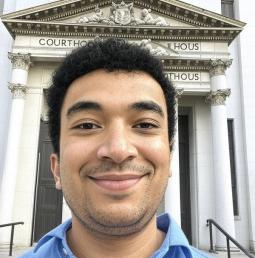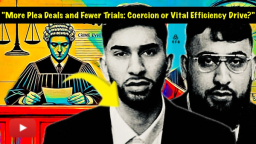🔴 Are People Being Coerced Into Guilty Pleas? Shocking Facts Revealed
Are defendants pressured into guilty pleas? We cut through online claims to reveal how plea decisions really work in the UK legal system.
Within online discussion, it is being claimed that many people are in jail, having pleaded guilty to offences they may have not have committed, on the basis of bad advice.
The allegation is that they are being pressured by duty solicitors into not contesting the charges against them, possibly even unaware that they have this option.
This is a serious allegation, as failing to explain a client’s options in a clear and fair manner or trying to sway a client to follow a particular path would amount to serious professional misconduct, and if proven could have a devastating impact on public trust in the legal system.
However, this claim is usually presented without supporting evidence. Anyone with evidence to prove they had pleaded guilty on the basis of bad advice could vacate that plea and enter a not guilty plea. One recent, much publicised claim alleging coercion or bad advice from solicitor was rejected in court.
But on a matter so fundamental to the criminal justice system, with continuing controversy, it is vital to uncover what exactly is going on.
When an individual is accused of a crime and presented with their first opportunity to claim innocence or plead guilty, they will be told very clearly that they have every right to plead not guilty and proceed to a trial, where they can present their argument to be cleared of the charges.
An advising paralegal or duty solicitor has no option of skirting over this right or mentioning it only briefly or casually, under the assumption that the client will not be interested in this offer.
Safeguards are in place to ensure that the client is fully informed of their options and that the decision is entirely with the client. In any case where it is later found that options not made clear, the court would reject a plea as invalid.
Their role of a legal counsel in all decision making is to follow the client’s instruction, remaining impartial and leaving decisions in the hands of the client. They have a responsibility to urge a client to reflect, but if a client who wants to follow a plan of action that has a very low chance of success, they have every right to do so, - without condemnation or criticism.
Legal representation can take on the evidence against a suspect, however strong. For any client who makes a not guilty plea, a lawyer’s role to help them build the strongest possible legal defence for trial. The client decides.
The not guilty option is very real, and in the majority of cases a person accused of a crime can say they are not guilty, benefit from the full presumption of innocence, and return to freedom pending trial.
But as we have covered in a previous article, pleading not guilty is not always the best option - for several reasons.
There is controversy as to the role of early plea discounts, framed in some online discussion as a sort of ‘special offer’ that could tempt someone to plead guilty when they otherwise would not.
So let’s be clear: early plea discounts are not handed out for ‘giving in’ or ‘ticking a box’ to get a time-limited special offer.
Discounts are for those who have fully understood the crime they are accused of committing, understood the state of the evidence and understood the legal likelihood of their actions being found to have been criminal.
Faced with this, if they fully agree that they have broken the law can they choose to plead guilty and express remorse for their actions, with a likely sentence reduction of 30%.
Cutting through surrounding legal complexity, the decision on how to plead boils down to: did you do it or not?
And this is where hard realities become apparent: winning a legal case is not the same as getting people to take your side in a pub discussion or online chat.
Whatever your opinion on the law, you are now in its grasp. Your options are to plead guilty, or be judged according to the law. You can prepare to go up against an adversarial barrister in a court of law where a jury will have all relevant law points explained to them and all the evidence against you put forward at full length and in full detail. They will then be asked to apply the law, as it stands, to your case, making no exception for their personal feelings towards you.
Going into this scenario when the evidence, and the law, are not on your side might feel a lot less appealing when you are in that situation than some online commentators, championing the idea of taking on the system, may make it sound.
This is the legal realm, and advice or comment from anyone lacking necessary expertise is not going to be of much help.
To recap - when someone is first arrested or charged, their understanding of the offence — and of their chances in court — may be very different from the legal reality. This is why, before any plea is entered, a solicitor or accredited police station representative (often a qualified paralegal) will explain in clear terms:
• What offence is actually being alleged, including the precise statutory wording or common law definition.
• What the essential elements of that offence are — in other words, what the prosecution must prove beyond reasonable doubt.
• What potential legal defences exist, and crucially, which ones are not legally recognised or would not succeed on the known evidence.
• The likely evidential strength of the prosecution case, based on the disclosure received so far — for example, CCTV footage, forensic evidence, witness statements or admissions.
• The realistic sentencing range if convicted after a trial, and how much that could be reduced by an early guilty plea.
For some defendants, this advice can be a turning point. They may have believed that what they did was lawful, or that they could rely on a defence that does not actually apply in law — such as claiming “self-defence” where the legal threshold is not met, or arguing “I didn’t mean harm” when intent is not relevant to the offence. They may also underestimate how compelling certain evidence would appear to a jury. Once those misconceptions are corrected, a guilty plea may no longer seem like a surrender, but a pragmatic acceptance of a likely outcome.
From the outside, a decision to plead guilty after receiving such advice can look like coercion. In truth, it is usually the product of a clear-eyed assessment of the facts, the law, and the risks of contesting the case. The early plea discount is not a tool of coercion, nor a penalty for “fighting your corner”, but a recognition of genuine acceptance of guilt under strict legal standards, coupled with the practical benefit of avoiding a contested hearing.
Criminal proceedings are not meant to be a game of odds. The question is not “what are my chances?” but “did I commit this offence under the law?”. Once the legal definition is applied to the evidence, the decision is often clear.
In that context, choosing to admit guilt early — even in the face of a strong desire to contest the charge — is often less about giving in to pressure, and more about confronting the unvarnished reality of the law as it stands, the strength of the evidence, and the likely verdict if the matter goes before a jury.
Coerced into pleading guilty? More likely, recognising that a guilty plea is in a suspect’s best interests. When you are in trouble with the law, you may well decide that you don’t like the law. But your chances of fighting the law and winning? Always slim.
Well, that’s all for now. But until our next article, please stay tuned, stay informed, but most of all stay safe, and I’ll see you then.




